National
2019 polls budget: Saraki hits executive, says it lacks foresight

• Senate President driving Nigeria to the cliff edge –Presidency
Niyi Odebode, John Alechenu, Olalekan Adetayo and Ifeanyi Onuba
The President of the Senate, Dr Bukola Saraki, on Sunday berated the executive, alleging that its late submission of the Independent National Electoral Commission’s budget for the 2019 elections showed its lack of foresight.
Saraki, in a statement by his Special Adviser on New Media, Olu Onemola, berated the President Muhammadu Buhari Media Organisation for accusing him of slowing down the approval of the budget.
The group had accused Saraki of postponing the resumption of the Senate in spite of Buhari’s submission of INEC’s budget.
But Onemola in the statement said the National Assembly was committed to the approval of INEC’s budget for the 2019 polls.
Saraki’s aide said in spite of the failure of the executive to submit the budget on time, the committees of the National Assembly had been working to ensure that due process was followed in approving the request.
He stated, “By now, the Nigerian people are aware that the executive branch could have submitted INEC’s 2019 elections budget at the time it submitted the 2018 appropriation proposals last year.
“The executive had from January till June this year to submit the budget request. However, due to a perceived lack of foresight, display of usual tardiness or an attempt to ensure that due process would not be followed, this request was submitted only a few days before the statutory National Assembly annual recess.
The aide said groups like the Buhari Media Organisation that had worked assiduously “with conscientious ignorance as their guide to attempt to scapegoat the Senate President for the failure of the executive to submit INEC’s 2019 election budget on time.
“More importantly, the Electoral Act passed by the National Assembly to help legalise the various innovations that needed for free and fair elections is still absent because President Muhammadu Buhari chose to withhold his assent the first time it was transmitted.
He recalled that INEC had stated that it was confident and comfortable with the thorough and transparent response by the National Assembly.
The executive is not to blame – Minister’s aide
But in his reaction on Sunday, the Media Adviser to the Minister of Budget and National Planning, Mr Akpandem James, said it was not true that the INEC budget was received and kept by the executive.
James said that since the budget came in form of supplementary budget, it was not proper to send it with the national budget.
He said the national budget is usually sent by the executive and passed by the National Assembly before the supplementary budget would be forwarded to the parliament.
James said, “INEC budget came as a supplementary budget. You don’t send the supplementary budget to the National Assembly when the substantive budget has not been passed. That is why they call it supplementary. So when was the budget passed? When was it assented to? Those are the issues.
“If the budget was passed early, that supplementary budget would have been sent to the National Assembly. The supplementary budget was sent one month, in fact the following month.
“The budget was signed in June and in July the supplementary budget was sent to the National Assembly. So, it’s not that INEC budget came and it was kept. Supplementary budget is sent to the National Assembly after the substantive budget has been passed.”
Don’t stampede N’Assembly, experts tell executive
Meanwhile, some finance and economic experts have called on the executive not to stampede the National Assembly into passing the election budget of INEC.
Those that spoke to one of our correspondents during separate telephone interviews were the Lead Director, Centre for Social Justice, Barrister Eze Onyekpere, and a Developmental Economist, Mr Odilim Enwagbara.
Odilim said while it was important to appreciate the urgency of the supplementary budget, the National Assembly should not bow to threats from the executive.
He said the National Assembly committee should scrutinise the INEC budget effectively, adding that a country of the size of Nigeria should not have such huge allocation for elections.
Odilim said, “It’s important that the leadership of the National Assembly appreciate the urgency of the supplementary budget, but it should not allow itself to do so out of fear and threat.
“It will be difficult for the executive to expect from the same National Assembly leadership it is threatening to remove to happily pass the executive’s supplementary budget.”
In his comments, Onyekpere called on the National Assembly committee to do what is best for the country under the current circumstances.
He said, “If I am right, the executive wants the funding to come from some of the constituency projects of the National Assembly but that is a mischievous way to look for funding because the government has all the time since January to submit the budget.
“It was submitted late and now they are asking for an amount that is contentious which may not be fully granted. They should look for an alternative way of funding the INEC budget.”
Saraki driving Nigeria to the cliff edge –Presidency
The Presidency on Sunday described as false accusation a statement credited to the President of the Senate, Bukola Saraki, that the executive was to blame for the delay in approving the supplementary budget for INEC.
The Senior Special Assistant to the President on Media and Publicity, Garba Shehu, reacted on behalf of the Presidency in a statement made available to journalists.
Shehu said, “The Senate President should look into the mirror and what he will see is his own face. He is solely to be held responsible for deliberately driving the nation to this cliff edge as far as the preparations for next elections are concerned.”
He stated the fact that the INEC proposals came after the President had laid the 2018 budget before the National Assembly meant that the electoral commission’s proposals would be sent as a supplementary budget.
This, he said, was clearly stated to the federal lawmakers by the Minister of Budget and National Planning, Udo Udoma.
“A supplementary budget cannot be submitted until the main budget is passed, and so the delay in passing the main budget was the reason for the delay.
“The National Assembly passed the 2018 budget seven months after the document was submitted to the National Assembly by President Buhari. Unless someone has forgotten, the budget was submitted to the National Assembly and it took the Saraki-led National Assembly seven months to release it.
“There is no way President Buhari could have submitted a supplementary budget while the main one was still pending. It is never done. Because Saraki did not return the main budget, we could not have submitted the supplementary one,” he said, adding, “After the long delays, the President was pained to sign the much distorted, butchered and debauched document.”
Shehu also recalled that in giving his assent, Buhari said he was compelled to sign the budget so as not to keep the economy continuously on a standstill.
“When I submitted the 2018 Budget proposals to the National Assembly on 7th November 2017, I had hoped that the usual legislative review process would be quick, so as to move Nigeria towards a predictable January-December financial year,” he quoted the President as saying.
Shehu said it was noteworthy that it was the first time in Nigeria’s history that a government would bring together the cost of an election in one budget, with each agency involved invited to defend their portion of the budget before the National Assembly.
This, he said, was all part of the transparency that the government was known for.
He claimed that in the past, governments would approve INEC budgets and funding without a breakdown, “often using ways and means to fund it, not so under President Buhari.”
Face governance, leave Saraki alone –Senators
Senators Isah Misau and Rafiu Ibrahim have called on the All Progressives Congress and its leaders to stop the blame game, face governance and leave the President of the Senate, Bukola Saraki, alone.
The two senators made the call in a joint statement they signed in Abuja on Sunday.
They urged the ruling party to stop seeking to find a scapegoat in Saraki over its failure to fulfil electoral promises it made to the Nigerian electorate when it came to power.
According to them, the APC and its leaders have continued to whine about what Saraki did or did not do to ensure the Buhari government failed without caring whether it was reasonable to believe that an individual who had been continuously assailed by the government would at the same time be in a position to ground the government.
The statement read in part, “APC leaders are being clever by half. They have spent most of the last 38 months harassing Saraki and sponsoring media attacks against him.
“Now that the man has been vindicated by the courts and he has decided to leave their party, they have devised another propaganda stunt to start heaping the blames of their failure to bring positive change to Nigeria on Saraki.
“For three years of the APC administration, former President Goodluck Jonathan was the scapegoat they blamed. Now that it dawned on them that nobody is listening to that tale by moonlight again, their propaganda machinery has shifted focus to Saraki as the new man to blame. These are characters who cannot take responsibility for their inability to provide good governance as they promised.”
The senators said it was irresponsible for people invested with a popular mandate to always look for somebody to be held responsible for their failure to fulfil their promises and give expression to the mandate they were given.
They wondered why the APC-led administration was dissipating energy on the blame game when it should be concentrating on how to use the next six months before the elections to improve the standard of living among Nigerians.
“The new leadership of the APC has continued to advertise the inability of the party to manage victory, their penchant for violence as a way of saving their faces and their lack of the much needed temperament to weld together a country with diverse culture, ethnicity and religion like Nigeria,” the statement added.
Blackmail can’t stop anti-corruption war – APC
In his response, the National Publicity Secretary of the APC, Yekini Nabena, said no amount of blackmail would deter the Buhari administration from pursuing its anti-corruption war.
He also said the call for Saraki’s resignation was a question of morality and that the party would still insist that he either leaves or be impeached.
Nabena said, “We will not succumb to blackmail; well-meaning Nigerians know how Saraki has been using his position to undermine this administration. Like I have said it before, the fight against corruption will continue and Nigerians know this administration has performed.”
-

 Sports4 days ago
Sports4 days agoFA Cup: Man Utd suffer fresh triple injury blow ahead Coventry clash
-
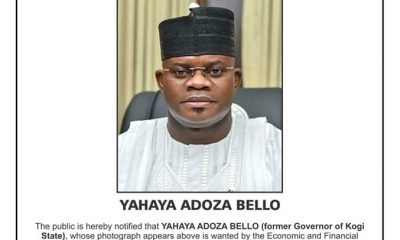
 News6 days ago
News6 days agoJUST-IN: EFCC declares Kogi ex-gov, Yahaya Bello wanted
-

 News6 days ago
News6 days agoPort Harcourt company gifts plot of land to Law Graduate, Anyim Veronica
-
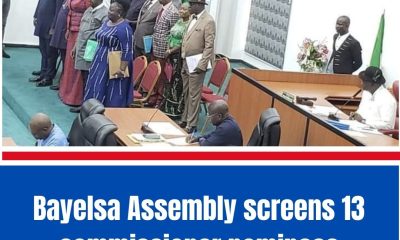
 Politics6 days ago
Politics6 days agoBayelsa Assembly screens 13 commissioner nominees
-
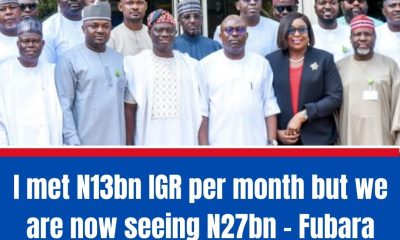
 Business3 days ago
Business3 days agoI met N13bn IGR per month but we are now seeing N27bn – Fubara
-
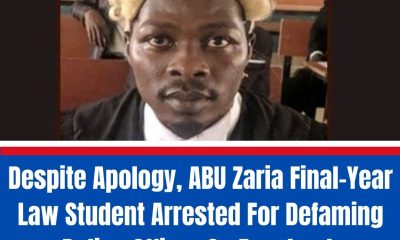
 News4 days ago
News4 days agoDespite Apology, ABU Zaria Final-Year Law Student Arrested For Defaming Police Officer On Facebook
-
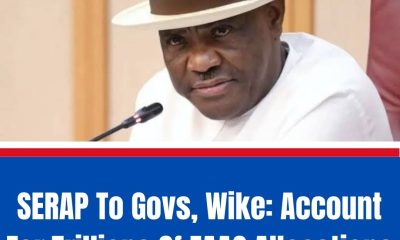
 Politics3 days ago
Politics3 days agoSERAP To Govs, Wike: Account For Trillions Of FAAC Allocations
-

 News2 days ago
News2 days agoCourt orders Becky Buodeigha alias Becky Minaj, CEO of BM Secrets to pay Baraza N7m




















